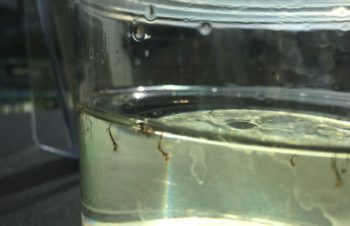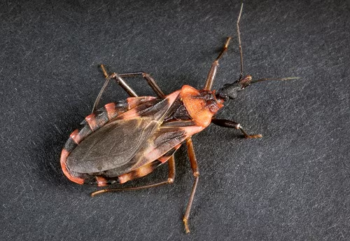County of San Diego officials said Friday that mosquito prevention isn’t just about West Nile virus anymore — it’s also about Zika virus, and people need to dump out standing water around homes to protect themselves and their communities.
County Supervisor Greg Cox, Deputy Public Health Officer Dr. Sayone Thihalolipavan and environmental health officials held the County’s annual mosquito-prevention kickoff Friday morning at Lincoln Acres County Park in National City.
Standing next to a table with mosquito larvae, mosquito-eating fish and in front of a wading pool, old tire, toys, tarps and other places people might find water in their yard, Cox said the County’s “Prevent, Protect, Report” call for the public to fight mosquitoes was more important than ever.
In particular, he said, that meant finding and dumping out water around homes, whether it’s a house or an apartment.
“Because we’re not just fighting West Nile virus anymore,” Cox said. “We’re also fighting the Zika virus. And the fight against Zika will be waged neighborhood by neighborhood, backyard by backyard.”
Cox and Thihalolipavan said that was because the invasive Aedes mosquitoes that can spread Zika love to live and breed near people — in yards and even inside homes.
Zika is a tropical disease and not normally found here in San Diego County. But county residents who travel to other countries and places where Zika is established can return home infected. They then become targets for invasive Aedes mosquitoes that can spread the virus to others.
“You could be growing invasive Aedes mosquitoes.”
Last year, 82 county residents tested positive for Zika after traveling abroad.
In 10 of those cases, County Vector Control crews found invasive Aedes mosquitoes living near people who tested positive after traveling abroad. To protect public health, Vector Control hand-sprayed people’s yards in 10 neighborhoods to kill mosquitoes and keep them from potentially spreading Zika.
The County’s Vector Control Program uses helicopters to drop granular larvicide that is harmless to people and pets but kills mosquito larvae on 48 waterways around the county. It treats another 1,400 potential breeding areas by hand, gives out free mosquito-eating fish, collects and tests dead birds for West Nile virus and tracks Zika cases.
“But we need the public to join our effort,” Cox said. “Dumping out standing water inside and outside your homes is really important. Because if you don’t you could be growing invasive Aedes mosquitoes. They can breed literally in a bucket, a discarded cup, in a toy left outside in the yard, even a bottle cap.”

Thihalolipavan said that West Nile virus was still a threat. In 2016, 22 county residents tested positive for West Nile virus and two people died.
Thihalolipavan said that about 80 percent of people who become infected with West Nile virus never know it. Roughly 20 percent get mild, flu-like symptoms. But, he said, in rare cases West Nile can make people extremely ill, and even kill them.
The doctor said that like West Nile virus, eight out of 10 people who get Zika never know it, and those who get sick generally only feel mild flu-like symptoms, along with a rash and red eyes. However, Thihalolipavan said, Zika has also been linked to a terrible birth defect. Pregnant women who become infected can have babies with microcephaly, which leaves infants with smaller brains and skulls.
Thihalolipavan urged all county residents who planned to travel anyplace where Zika is established to protect themselves so they did not become exposed.
“Protect yourself from mosquitoes,” he said. “Remember that invasive Aedes mosquitoes like to bite during the day. Wear insect repellent, wear long-sleeved shirts and pants. Visit your doctor before you go. If you plan to have sex during your trip, use condoms, because Zika can be spread sexually as well.”
Thihalolipavan said the national Centers for Disease Control and Prevention was advising pregnant women not to visit places where Zika was established, to protect their unborn children.
Thihalolipavan again urged the public to help fight mosquitoes.
“I know as the father of a small child, I’m going to go around my home and make sure I don’t have any standing water,” he said. “Because if my child got sick … I know I would feel bad and responsible knowing I could have prevented it. So let’s all do our part.”
For more information, go to the County’s Fight the Bite webpage.





